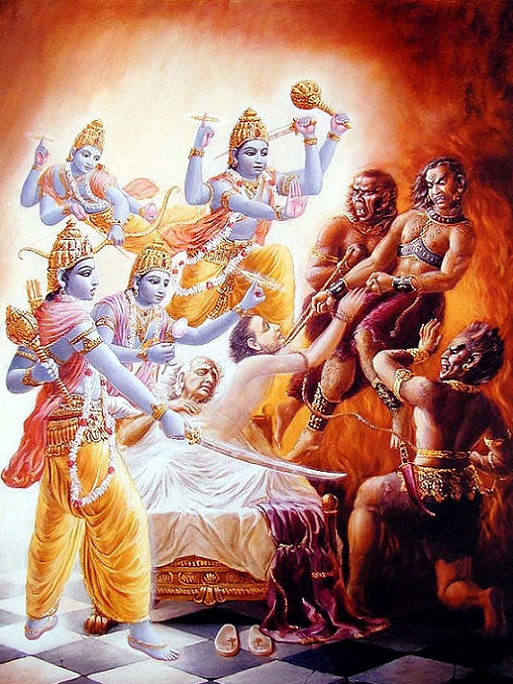(The Visnudutas and Yamadutas fight over Ajamila's soul at the time of death)
Prabhupāda: So Yamarāja is a great devotee, Vaiṣṇava. We should not be afraid of Yamarāja. Those who are devotees, they are... Yamarāja says that, "I offer them respect, my obeisances." He advised his messengers that, "Don't go to my devotees. They are to be offered respect by me. You go to persons who are reluctant to chant Hare Kṛṣṇa mantra. You go there and bring them here for judgment." The Christian also believe "The day of judgment." The judgment is given by Yamarāja. But who goes to his court for judgment? The criminals, those who are not devotees, those who are not Kṛṣṇa conscious, they go to the court of Yamarāja.
So in other words, it is the duty of the Yamarāja to see that everyone is becoming Kṛṣṇa conscious. That is his duty, just as the police department's duty is to see that everyone is law-abiding, acting according to the law of the state. Police is not anyone's enemy. He is enemy to the criminals, not to the law-abiding citizens. I have seen it, personal experience. In one of my friends' house there was burglary. The police inquiry was there. So we were going in another's house, the policemen and we also. So we saw in distant place a few men were fleeing. They were going away, hastily running away. So I inquired the police, "Why these people are running away?" So he answered, "You do not know, Bābājī, that they are criminals. Because we are passing, they are thinking, 'Now the police is coming to arrest us,' although there is no purpose. How one can arrest? But they are..." What is called, this? Culprit mind is always suspicious. Because they are culprit, criminals, as soon as they saw, "The policeman is coming," they began to go away, run away.
So Yamarāja is not to be afraid by the devotees. This is the purpose. And it is the Yamarāja's duty to see that these rascals who have forgotten Kṛṣṇa, or God, and come here to enjoy material sense gratification, they must be punished. Because material sense gratification is always sinful. We may create so many artificial laws, "This is good, and this is bad." Just like in your country, drinking is good, and in some other country, drinking is bad. In your country, meat-eating is no offense, but in the Vedic civilization, meat-eating is one of the foremost sinful activity. So here the so-called "good" and "bad," they are all mental creation. Otherwise, everything is bad, nothing good. Here, only goodness is to become Kṛṣṇa conscious. Otherwise, everything is bad. So-called ethics, morality and law, good and bad, they are all rascaldom. It has no meaning. Because they are punishable. They can avoid the punishment of the law of the state. Just like in the government in every state, there is some punishment if one kills another living entity. Another man, not living entity. There is punishment. The law punishes. If you kill somebody, if you commit murder, then you will be punished. This is punishable. But because it is man-made law, therefore it is defective. A man is a living entity, and a cow is also a living entity. Why this discrimination, that if a man is murdered or killed, that murderer must be punished?
But that law is not permissible in God's law. In God's law, either you kill a man or you kill an ant, you are punishable. You are punishable. You cannot avoid this. Because in the eyes of God, the Brahmā, Lord Brahmā, and a small ant, they are all sons of God.
sarva-yoniṣu kaunteya
sambhavanti mūrtayaḥ yāḥ
tāsāṁ mahad yonir brahma
ahaṁ bīja-pradaḥ pitā
(BG 14.4)
Kṛṣṇa says like this, "I am their father." To whom? Sarva-yoniṣu: "In all species of life, beginning from Brahmā down to the ant." So if you kill your brother, say, who is not important, will your father approve, "Oh, you have done nice. You are very nice son. You are earning millions of dollars, and this man is useless, this, this boy. So you have killed. It is very nice"? No, father will never tolerate. To the father, the useless son and the earning son, both are equal in affection.
So therefore it is the duty of the elderly son, those who are advanced, not to kill the insufficient son, but to give them education of Kṛṣṇa consciousness. This is the duty. It is not that, "Because this living entity is useless, then kill him." So you can kill, but you will be implicated. Therefore Yamarāja is there. Yamarāja's business is to see how much sinful this living entity is, and he is offered a similar body. Karmaṇā daiva-netreṇa (SB 3.31.1). You will be judged after your death, every one of us. Of course, if he takes Kṛṣṇa consciousness seriously, then the path is automatic. Automatically you go back to home, back to Godhead. There is no question of judgment. Judgment is for the criminals, the rascals, who are not Kṛṣṇa conscious. But if you become Kṛṣṇa conscious, even if you cannot finish the job in this life, even if you fall, still, you will be given another chance of human body, to begin where you ended, to begin from the point where you fell down.
(Srila Prabhupada Lecture, Los Angeles, January 5, 1974)
.
